Spoiler alert: teenagers are jerks. But I'm sure I don't have to tell a teacher that. In the ninth grade, when Lord of the Flies was handed out, I opened my copy to see that the kid who'd had the book before me had written "Piggy dies" on the first page. But for this heartless ballpoint scrawl, it may have taken me much longer to determine the fates of those characters. Unfortunately, the same can't be said for the pedestrian young adult actioner, The Maze Runner, which manages the impressive feat of making a homicidal labyrinth seem predictable.
I'm sure, through the course of your career, you've had to read more than your fair share of book reports on the dystopian teen novel of the moment. The granddaddy of them all would be the aforementioned Lord of the Flies (from which The Maze Runner borrows liberally). There's also The Hunger Games Trilogy, the Divergent Series, The Giver—the list goes on, and you've no doubt become familiar with all the genre's tropes. Sadly, so has the audience for these novel to film adaptations. Sure, the market is oversaturated, so it would be easy to say that The Maze Runner suffers from a case of bad timing. But lack of originality isn't the film's biggest problem. It's the lack of heart.
Thomas is a 16 year-old who wakes up in a rusty box in the middle of a maze with no memory of his past. The centre of the maze, called The Glade, is inhabited by a group of boys who have been trying to find a way out with no luck. Thomas must convince the boys to give up the relative security of The Glade for a chance at freedom by risking escape through the ever-changing, monster-inhabited maze.
Kids are naturally curious, so spending your days with them means you have to be quick with answers. The biggest puzzle in this film is that none of the boys know where they came from or why they're there. Which would be fine if the film wasn't so reluctant to feed us any interesting clues. Without backstory it's impossible to care about these boys, so, instead of characters we can root for, we get archetypes: Thomas, the fearless protagonist; Alby the damaged leader; Minho, the ethnic sidekick; Gally, the bully. We even get Chuck, the loveable fat kid.
You can guess what happens to him.
I wonder, as an adult authority figure, if you've ever had to utter the phrase, "Because I said so"? Even as you say it, you know it's a weak argument. But it's usually enough to placate the little brats, isn't it? But only for so long. When the adults in The Maze Runner do show up, it's only to offer a Cole's Notes explanation for their actions. By this point they'd lost all credibility. So, like a petulant child, I stopped listening.
Your job exists because child labour laws require that minors working on a film set are supervised at all times. In addition to teaching, you have to ensure the health and welfare of the children in your charge—from watching what they eat at the craft service table, to making sure Teamsters don't curse in front of them. You spend so much time with these kids that I'm sure you grow attached. In the case of The Maze Runner, the teen cast is inordinately talented. But instead of being given fully fleshed-out characters to play, they're primarily relegated to physical activity and/or exposition delivery. It doesn't matter how ominous and imposing the maze is, or how terrifying the monster special effects are...if we're not emotionally invested in the kids' future, the whole endeavour is a lesson in futility.
Don't let go of the conch,
Di







